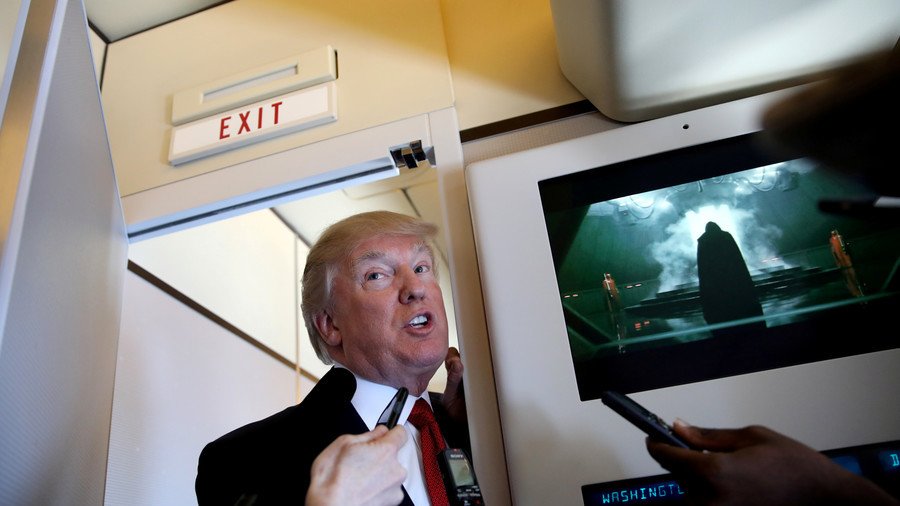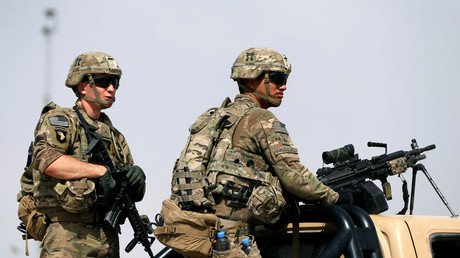Donald Trump’s First Year and the Illusion of Choice

The striking thing about Trump’s first twelve months compared to the Obama administration is not how different his foreign policies have been, but how similar.
January 20 marks one year since Donald Trump officially became the 45th President of the United States. His supporters, boosted by comments the Donald made on the campaign trail, hoped his Presidency would mark a shift away from a neocon/liberal interventionist foreign policy. In fact we’ve just had more of the same.
The old French saying ‘plus ça change, plus c'est la même chose (the more things change the more they stay the same)’ springs readily to mind. As indeed does the late George Carlin’s comment about Americans only having the “illusion of choice” on the things that really matter.
Let’s go back to October 2015. Despite his dodgy haircut, real estate mogul and television personality Donald Trump is the front-runner in the race to become the Republican Party’s Presidential candidate. The elite punditocracy is still expecting him to slip up. In an exclusive interview with Britain’s liberal Guardian newspaper, Trump says that the US needs to focus on itself – and not on “nation building” abroad.
“The United States owes $19tn,” he said. “We have to straighten out our own house. We cannot go around to every country that we’re not exactly happy with and say we’re going to recreate [them].
“It hasn’t worked” he continued. “Iraq was going to be a democracy. It’s not gonna work, OK? It’s not gonna work and none of these things will work.”
Paleocons, libertarians and foreign policy isolationists took great heart from Trump espousing such sentiments. As did regular American citizens, sick and tired of endless war. Neocons were less happy. An ‘America First’ President – who would prioritize on domestic problems ahead of foreign ‘interventions’ – was the last thing they wanted. So the attacks on Trump began.
But Trump’s rhetoric was, from the start, contradictory. While condemning the invasion of Iraq, he also said that he supported US military interventions in other circumstances. Anyone believing that Trump would be the President to “bring the boys back home” wasn’t playing close enough attention.
#Covfefe, Little Rocket Man and ‘stable genius’: A year of Trumpisms https://t.co/NfwaTtsrn1pic.twitter.com/vtyLvv19Cx
— RT (@RT_com) January 19, 2018
Moreover, his critique of the policies pursued by previous administrations was based on a false premise – namely that the US had attacked or intervened in other countries’ internal affairs in order to ‘bring democracy’ and ‘nation-build’.
The US might have been keen on ‘nation-building’ in the aftermath of World War Two, when its main concern was aiding strategically important countries which could fall prey to the communists, but it wasn’t doing it in the neocon era.
Here the aim of ‘interventions’ was not ‘nation-building’ but nation-destroying. The much-criticized ‘failure to plan’ post-invasion was actually the key part of the plan. The strategy (borrowing a phrase used by my fellow OpEdger Dan Glazebrook in his recent book) was ‘Divide and Ruin,’ not ‘Divide and Conquer’. If the US and its allies had wanted to nation-build in Iraq, why did they dismantle the entire state apparatus, including the Iraqi Army? And having seen how that turned out, why did they do almost exactly the same in Libya eight years later? The whole thing only makes sense if you understand that the resultant post-regime change chaos – which you didn’t have to be Nostradamus to predict – was exactly what the warmongers wanted.
It’s also worth pointing out that Trump – while regularly stating his desire to improve relations with Russia, for which he has been lambasted by the neocons – also critiqued the Obama administration for allowing Putin to ‘outsmart’ the US.
In 2014 he tweeted “Putin has eaten Obama’s lunch, therefore our lunch, for a long period of time.”
"@StandAtTheReady: Putin has eaten Obama's lunch, therefore our lunch, for a long period of time. - @realDonaldTrump VERY TRUE!!! #TeaParty"
— Donald J. Trump (@realDonaldTrump) March 14, 2014
He added: “We should definitely do sanctions and we have to show some strengths.”
In August 2016, Trump tweeted: “So with all of the Obama tough talk on Russia and the Ukraine, they have already taken Crimea and continue to push.”
This line on Obama – that he was actually too weak on Russia – has been repeated by Trump and some of his supporters since his election.
For eight years Russia "ran over" President Obama, got stronger and stronger, picked-off Crimea and added missiles. Weak! @foxandfriends
— Donald J. Trump (@realDonaldTrump) March 7, 2017
On an episode of RT’s Crosstalk last week I heard commentator Steven Malzberg declare: “Obama stood by and watched Putin take Crimea. Obama stood by and watched Russia go in to Syria. He stood by and watched the Uranium go to Putin. He stood by and did nothing nearly as much as he could have done when it came to cybersecurity with Russia... Yet it’s Trump who’s the Putinite… It’s Trump who’s in bed with Putin.”
But Obama didn’t appease Russia at all. It was his administration which helped kick things off in Ukraine, imposed tough new sanctions on Russia and – lest we forget – applied pressure on European countries to do the same.
If tough sanctions and increasing NATO’s presence right up to Russian’s borders is ‘appeasement’ then what would ‘standing up to Putin’ have meant – nuking the Kremlin?
Trump in office – whether we blame the ‘Deep State’, powerful foreign interest lobby groups, Wall Street, the ‘Military-Industrial Complex,’ or simply take the line that he never really intended to make a break with the past – has done more or less exactly what Obama would have done, had he been allowed a third term. Trump’s rhetoric is admittedly cruder (you can’t imagine Obama getting involved in ‘my button’s bigger than yours’ banter with Kim Jong-un, can you?). But don’t be fooled – the Donald is proving to be a very ‘normal’ American President. And that’s the big problem for those who genuinely wanted change in Washington.
On Afghanistan Trump, having dropped the ‘Mother of All Bombs’ in April, announced in August that US military intervention in the country was being expanded.
The same ‘Donald Trump’ had, just four years earlier tweeted:
Let’s get out of Afghanistan. Our troops are being killed by the Afghanis we train and we waste billions there. Nonsense! Rebuild the USA.
— Donald J. Trump (@realDonaldTrump) January 11, 2013
On Syria, the continuity between Obama’s policies and Trump’s has been detailed in this RT report.
Again those who hoped that a Trump administration would allow Syrians to sort out their own affairs have been left feeling disappointed. “Assad must go,” the refrain of Obama and Hillary Clinton, is still US policy.
On Iran, Trump has been more aggressive verbally – but he still hasn’t pulled out of the nuclear deal. Only last week he endorsed it for a third time, while warning Europeans that it must be changed.
By the same token, when we had anti-government street protests in Iran at the turn of the year, it was Trump who sounded like the classic Democrat ‘liberal interventionist/democracy promoter’, declaring: “The USA is watching very closely for human rights violations!” He promised that Iranian protestors would receive “great support” from the US.
A genuine isolationist would have said that Iran’s internal political disagreements were their own business and no one else’s. But Trump, as he’s shown from his first twelve months in office, is not Pat Buchanan.
It’s clear when we look back at how US foreign policy HASN’T changed substantively in the past year, that playing tit-for-tat Republican v Democrat party games is leading us into a cul-de-sac.
“You’re a Russian appeaser! Here’s a custard pie!”
“No your side appeased Russia more! Here’s a custard pie back!” is the current level of debate.
It’s only when Americans and everyone else starts to think outside of the false Republican-Democratic Party, ‘liberal-conservative’ paradigm that we will finally get meaningful change. To prove the point let me take you back to late 2000. Back then Simon Jenkins, one of Britain’s most respected journalists (and certainly one of its most thoughtful), expressed his relief that after the military interventions of the Clinton years, we finally had a US President who wouldn’t meddle. The President he was referring to was one George W. Bush. By 2016 we should all have learnt our lesson.
Follow Neil Clark on Twitter @NeilClark66
Think your friends would be interested? Share this story!
The statements, views and opinions expressed in this column are solely those of the author and do not necessarily represent those of RT.















